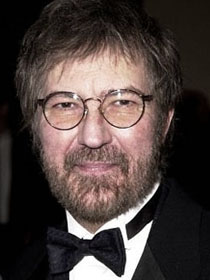 Native Texan Tobe Hooper was born in Austin on January 25, 1943. Little Tobe was frequently taken by his father to local theaters ("a movie every day," according to Hooper) and soon developed a love for celluloid. Native Texan Tobe Hooper was born in Austin on January 25, 1943. Little Tobe was frequently taken by his father to local theaters ("a movie every day," according to Hooper) and soon developed a love for celluloid.
As a child, Tobe performed magic tricks for audiences who paid to see his act - before finally turning his attention towards horror in his teens and making a series of 8mm shorts starring his high school buddies.
Hooper enrolled at Austin's University of Texas in 1962 and almost immediately gravitated towards the Department of Radio-Television-Film. He then gained experience directing industrial films, documentaries (including one on Peter, Paul and Mary) and various commercials.
His first feature was 1970's never seen Eggshells, a vehicle starring local UT residents and ostensibly a tale of Vietnam vets returning home.
When Eggshells failed to garner Hooper the notice he sought, the young director turned his attention to a film that would not only secure his own future...but would have a monumental cultural impact on his contemporaries, 1974's The Texas Chainsaw Massacre.
Chainsaw (initially titled Head Cheese) was loosely based on a variety of true crime sources not limited simply to the Ed Gein/Wisconsin horrors. Houston serial killer Elmer Wayne Henley and an offbeat doctor from Hooper's own past figured prominently in the final Chainsaw story concept.
The Terror Trap cannot undervalue the importance of The Texas Chainsaw Massacre. Hooper's cobbled together masterpiece was shot on a low shoestring budget of $60,000, requiring hellish days of sweat and toil in Round Rock, Texas. The hard work paid off and the pictures was a phenomenal success.
Indeed, while Chainsaw may be a savagely modern retelling of the classic Hansel and Gretel fairy tale, its visual (and symbolic) depictions of backwoods decadence, flesh rotting decay and bone white depravity have simply never been matched since.
Many wondered what Hooper would do next and in 1976, he released Eaten Alive. Trying to recapture some of the feel of the previous film, this one was about a rural motel owner with a penchant for feeding guests to his pet alligator. It received a limited release and wasn't a hit. Not familiar with it?
Perhaps you've heard of the movie under one of its other titles: Horror Hotel, Death Trap, or Starlight Slaughter. Definitely underrated and worth a look, if only for its black humor and very eclectic cast that includes Robert Englund, Mel Ferrer, Marilyn Burns (from Chainsaw) and Carolyn Jones (Morticia from The Addams Family TV series).
Next up was the the mini-series adaptation of Stephen King's Salem's Lot for television, a huge ratings success. This was followed by the troubled production of The Funhouse in 1981. The end product was very good and it made money...but there were budget issues during the shoot that required moving an entire carnival from Akron, Ohio to a studio in Florida.
In 1982, Hooper helmed Poltergeist, his most successful film ever. Steven Spielberg was the executive producer and it was suggested in some quarters that he actually directed much of the project.
Watching this beloved ghost film, one can't help but think it certainly has the look and feel of a Spielberg film. However, both men have denied the accusation.
1986 saw the release of Hooper's long awaited sequel to his seminal classic. But The Texas Chainsaw Massacre 2 was not a worthy follow-up...it took a drubbing from critics and was ignored by audiences.
In recent years, Hooper's films have been (for the most part) uneven. That includes an unnecessary remake of The Toolbox Murders in 2004. Here's hoping he finds a project well-suited to his immense talent, whether in television or on the big screen.
|